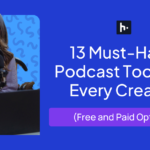This guest blog is by Alex Birkett.
Being a podcast host is hard. Some of it is certainly natural. But even the naturals have to work hard at delivering a great interview.
I’ve been a guest on dozens of podcasts, and I’ve now done 50+ interviews as a podcast host.
In the beginning, I wasn’t great. I was awkward, asked vague questions, and was overly nervous about the interview, which led to ineffective responses.
Through practice, mentorship, and lots of reading and feedback, I’ve become much better. Still not a “natural,” so to speak, but our podcast is growing and guests constantly say things like this:
“I’ve been in a few podcasts interviews and this has been the most fun. It’s nice to have an active participant in the conversation and learn a little bit about you as well, so I really appreciate that.”
This won’t cover the technical aspects of podcasting, including where to host your podcast. Instead, this post covers what I’ve learned about being a great podcast host and producing a great interview.
11 Contrarian podcast host tips
- Don’t send your guest a list of questions beforehand
- Play devil’s advocate
- Have long conversations
- Go off-script
- Tell your own stories and show your own weaknesses
- Ask dumb questions
- 5 Whys and Redundancy
- Don’t worry about “actionable takeaways”
- Don’t introduce them or ask them to introduce themselves
- Ignore growth for the first dozen episodes
- Don’t learn about your audience. Be your audience.
1. Don’t send your guest a list of questions beforehand
This might be the strangest thing I do, at least in the context of the business podcasting space.
I’ve been a guest on many podcasts. In almost every case, they sent me a list of questions beforehand. When they sent me questions, here’s what I did: I wrote in-depth answers for each of them before the interview. During the interview, I pretty much read them verbatim.
Which led me to think: why did we have to record this together? I could have just emailed you these or sent you a Loom video.
The magic of a podcast is often in the unexplored or unplanned territory. What you don’t expect someone to say is often infinitely more interesting than what you do expect them to say.
Granted, many people will be nervous to jump on a podcast with a stranger with no idea of what to discuss.
Therefore, I mitigate this fear in a few different ways:
- I send over general topic areas.
- I ask them “what are you on a soapbox about lately?” and “what are you banging your head about lately?” This helps me plan areas to talk about that they’re passionate about.
- I do a lengthy pre-podcast chat to warm them up and explain the concept.
This is really only for guests I’ve never met before. If I’m interviewing a friend, I just throw them in the deep end and have the discussion we would have if the mic weren’t even on.
2. Play devil’s advocate
When you feel that a guest is slipping into safe answers, you can do one of two things:
- Play dumb.
- Play devil’s advocate.
I’ll talk later about asking dumb questions, but here’s why playing devil’s advocate produces interesting answers.
You trigger a small defensive response when you say something contrary to what the guest believes. You can’t be too argumentative; otherwise, the interview can get hostile and they shut down. But if you simply say something like, “in my experience, I’ve seen [opposite of their views],” you can get them to defend their point with more vigor than otherwise.
Talking to an email marketer about retargeting? Say something like, “but isn’t email remarketing kind of creepy?”
Talking to a content marketer who believes in editorial style guides? Say something like, “I’ve tried to build style guides, but I often find they’re not useful for clients.”
This perks up their ears and gives them an “antithesis” to their thesis, which usually results in a synthesis (good old Hegelian dialectic).
3. Have long conversations
It’s hard to get people to book a long time period. People are busy. But I require guests to book 1.5-2 hours, regardless of how busy or important they are.
I took this cue from Lex Fridman, who does 3 hour long conversations with technical AI experts and huge names. If they can do it, famous content marketers can do it, too.
Why long convos? Because, like writing an article, the first few paragraphs are just warm up. The real meat of the conversation comes after 10-20 minutes of getting to know each other.
You can choose to edit this stuff out later and produce a 30-minute episode. But having the 2 hour conversation gives you enough material that what you keep in is actually really interesting.
Look, it’s hard to be a guest and only have 20 minutes to talk. There’s so much pressure to say pristine, intelligent things right off the bat. No one works well under that kind of pressure. So let the conversation breathe, and make your guests book longer time slots.
4. Go off-script
Back to that list of prepared questions: even if you send over questions beforehand, try to go off-script.
I don’t mean, “it’s okay to go off-script if it happens, but try to stay on course.” I mean, deliberately veer off course.
Again, I run a business podcast, but I’ll often ask questions like:
“Did moving to Hawaii affect your ambition and happiness?”
“What novels did you read as a kid?”
“What do you do outside of work?”
These questions serve two purposes.
First, regardless of how serious and professional your podcast aims to be, people love to know the person behind the tactics. Bringing personality and color to your guests helps people love them.
Second, these questions are easy and fun to answer, and they throw the guest off their normal “broken record” stock answers. I try to jar them into honesty by bringing things down to the personal and seemingly irrelevant. And then when I ask a follow-up question that is more technical and professional, their guard is down and they’ll give me a real answer.
5. Tell your own stories and show your own weaknesses
It feels weird telling your own stories, shifting the focus to yourself in an interview.
“Isn’t this interview about the guest?” you ask.
Yes. It’s about the guest. But an interrogation is rarely the best way to get them to truly open up.
People open up in conversations, not interviews. If you only ask and you don’t give anything of your own, the guest will always feel like they’re on the defensive to a certain extent.
I try to relate to things they say with my own response, not necessarily just the next question on my list. In fact, I’ll open up about my challenges, weaknesses, and vulnerabilities.
“I’ve always felt insecure about the fact that I’m a generalist,” I’ll say.
How much stronger is this than simply asking, “how do you feel about being a generalist?”
People want a sparring partner, not a punching bag. Give and take. It’s a conversation.
6. Ask dumb questions
I want to get down to the absolute roots of how someone thinks. I want the most specific description of a tactic or something they’re explaining.
The only real way to do this is to play dumb.
“Wait, can you back up? What *is* integrated marketing?”
“Okay, silly question but ______.”
“Can you explain more? I don’t really understand that.”
This takes the pressure off the conversation, which gets the guest out of their head. When you ask really tough, advanced questions all the time, people can get self-conscious. They begin to consciously concoct intelligent sounding answers that don’t actually get to the root of an issue.
So play it down. You’re the amateur, they’re the expert. Teach me something!
7. 5 Whys and Redundancy
Similar to asking dumb questions, I really drill down on specifics. I use the 5 Whys framework here.
When someone tells me a high level story about how their content team is set up, I’ll follow up with something like, “why did you set it up like that?”
When they tell me that they set up their content team like that after many reorgs, I’ll ask something like, “why have you decided to undergo so many reorgs? Is this because of evolving content strategy and goals?”
Then, “why are your goals and content strategy evolving?”
And on and on. I don’t move on to the next question right away.
I probably sound redundant, like an annoying broken record.
But the first answer someone gives is almost always obvious. The second answer is intriguing. And the third answer? That’s usually mind blowing.
8. Don’t worry about “actionable takeaways”
Marketers can be obsessed with “actionable takeaways” and tips.
However, you, as the host, need to ignore the tendency to push for these actionable takeaways.
When you’re explicitly chasing these things, the guest becomes self-conscious. They start to pre-plan their answers to sound a certain way. You’re after honesty, not actionability. Actionable takeaways are hard to predict.
Specifically asking the guest for tactics is an amazing way to bore yourself, the guest, and the audience.
9. Don’t introduce them or ask them to introduce themselves
Introducing the guest is awkward. Asking them to introduce themselves? Unbearable.
Do this later on your own. You can rattle off their job title, name, acumen, etc.
In the conversation, though? Just jump in.
Later, I do a podcast introduction that I record myself. Fun fact, I use Jarvis to write them. But it’s at this stage that I can fully flesh out who this guest is for the audience and capture their attention. Then I don’t need to make it weird in the conversation itself.
10. Ignore growth for the first dozen episodes
Chances are, you started your podcast for a reason.
While it’s certainly nice to have conversations with smart people, most podcasters have a bigger goal. It might be monetization through ads. It might be generating authority and eventually getting leads. It might just be a brand awareness play for a brand.
Lofty goals aside, focus first on getting your flow with the podcast and format.
Growth comes later. The first dozens of episodes are where two things happen:
- You iron out the kinks in the process and feel comfortable podcasting
- You get past the emotional obstacle of a dozen episodes and get into a routine
Once you’ve got those things figured out, you can figure out how to drive email subscriptions with your podcast, sell ads, promote yourself on other podcasts and co-marketing partnerships, or translate your podcast transcripts to a global audience.
But first, focus on quality.
11. Don’t learn about your audience. Be your audience.
If I’m not having fun in my conversations, I’m going to stop doing my podcast. Not only that, if I’m not having fun, it bleeds into the guest’s responses, and then the podcast itself is boring.
Turns out, you have to be your own audience to a certain extent.
Virginia Zacharaki at Moosend gave me this tip:
“A successful podcast host needs to understand what the audience thinks and feels when listening to their podcast. Being at one with the audience and thinking like a fan enables podcast hosts to better engage their audience with spot-on questions to the visitors and enticing content that entertains and educates. Understanding what makes the audience tick and what piques their interest is an integral part of being a successful presenter.”
I find that you can do audience research (and feedback really helps), but what really helps is when you yourself are interested in the same things as your audience. That’s the secret that makes most podcasts worth listening to.
Conclusion
Hosting a podcast is hard work. What you think will work sometimes backfires (like when you pre-send questions or push for actionable answers).
What usually works, as a heuristic, is making the guest feel comfortable and like they’re having fun. It should be fun – for both you and the guest.
When you’re having fun, you lose track of the recording, the audience. You speak more honestly, and through honesty, you produce differentiated content.
And through differentiated content, you grow an audience. That’s how you win.





